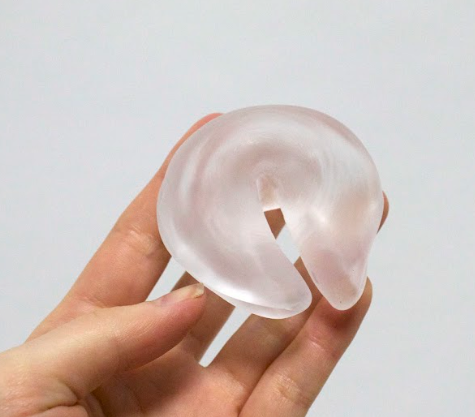- Home
- Glass Fortune Cookie
Glass Fortune Cookie
Product description
This series is a study of the fortune cookie as a symbol of cultural fusion, hope, and resilience.
"Like many Americans I’ve been eating fortune cookies for years not knowing the origin of this fun and sweet tradition. It was my favorite part of getting Chinese takeout. I love the ritual of going around the table and asking everyone what their fortune said and speculating what it could mean.
Even if people didn’t want to eat the cookie they couldn’t resist cracking one open just to find the note. It's always a vague message, usually optimistic, but sometimes a cautionary riddle. It's always a thrill to receive a fortune. I’d nibble the cookie by breaking off pieces, trying to deconstruct it into triangular segments. It’s such a curious and clever shape. I’d think, “How did they cook it with the paper inside?”
- Momoko Schafer
In the US these treats are known as a Chinese takeout dessert. Its origins aren’t completely clear but it most likely comes from Japanese crackers, osenbei, and the fortune telling traditions of omikuji.
The first fortune-telling tea cracker is believed to have been served at San Francisco’s Japanese Tea Garden. During WWII all things Japanese became taboo but this fortune cracker was adopted and continued to be served by Chinese Americans, hence its current association.
The evolution into its final form as the vanilla flavored wafer treat with a hidden note is actually uniquely American. I find the cultural fusion and the resilience of the Fortune Cookie to be fascinating and worth capturing in a crystalline form.
Momoko is based out of the San Francisco Bay Area, and her current body of work reflects on the recent experiences as an East Asian passing woman. Many of her past work showcases interactive installations and wearable sculptures to break down social expectations while centering healing and inclusivity. During the Pandemic her piece ‘Prejudice Is A Disease’ was featured on The Boston Globe.
Momoko stars in the debut of Netflix’s Original Series, ‘Blown Away’, a glassblowing art competition showcasing 10 artists from the US and Canada. Outside of glass, Momoko is curating a zine for Self Love Social Club, sponsored by the Massachusetts Cultural Grant. She has also led many artist talks and panel discussions at various organization such as the Corning Museum of Glass, Massachusetts College of Art and Design, and at the Robert M. Minkoff Academic Symposium. To engage with Momoko’s decade of experience in the world of Art and Glass consider seeing her Services.









